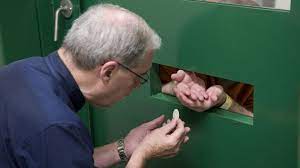
(To hear the audio version of this post, please visit http://brothersinchristcmf.org/wp-content/uploads/2021/07/Mass-Blog-for-the-18th-Sunday-in-Ordinary-time-2021.mp3)
When you’re in solitary confinement, sustenance is scarce whether your prison is a 10 x 10 cell or a vast expanse of desert. Or a crowded city block, for that matter. In all cases, the solution is to BE sustenance. Our Jewish brothers and sisters gained that wisdom through centuries of spiritual trials as they looked death in the face.
Christians can share in their lessons as taught by teachers both Biblical and historical. Dr. Edith Eger is both. The faith she learned came by way of an Auschwitz death camp. It was there at the age of 16 where she lost her parents but gained a philosophy of eternal life.
Before Auschwitz Eger was an aspiring dancer in Hungary. In that death camp she earned the name ‘The ballerina of Auschwitz’ by being forced to dance for Josef Mengele, the doctor who experimented on Jewish children and became known as “the angel of death.” Mengele gave her a piece of bread after one performance—which she shared with other girls imprisoned with her. Later, while on a death march and growing weaker, the same girls with whom she shared her bread saved her from being shot by forming a human chair and carrying her.
Decades later, when Eger pursued a university education in the United States, she discovered Viktor Frankl’s “Man’s Search for Meaning” and eventually became a therapist who helped others survive life’s solitary confinements. Her mission: to help people “stop running from the past, do everything possible to redeem it, and then let it go.”
That’s the lesson Paul teaches us in this Sunday’s liturgy, through his letter to the Ephesians (Eph 4:17, 20-24), where he advises us to:
… put away the old self of your former way of life, corrupted through deceitful desires, and be renewed in the spirit of your minds, and put on the new self, created in God’s way in righteousness and holiness of truth.
The prison of the old self is exemplified by the desert through which Moses led the Israelites, as detailed in Sunday’s first reading (Ex 16:2-4, 12-15). They were imprisoned by their fear of death, but they weren’t afraid to chastise Moses for their situation.
“Would that we had died at the LORD’s hand in the land of Egypt,
as we sat by our fleshpots and ate our fill of bread!,” they complained.
But it was through Moses that God fed them—not only with bread, but by His spirit of wisdom. In fact Jesus himself would cite this Old Testament lesson he learned as a boy: “it is not by bread alone that people live, but by all that comes forth from the mouth of the LORD. (Deuteronomy 8:3)
In Sunday’s gospel reading (Jn 6:24-35), Jesus embodies that lesson, teaching people hungering for hope the difference between perishable and eternal sustenance:
Do not work for food that perishes but for the food that endures for eternal life, which the Son of Man will give you. … For the bread of God is that which comes down from heaven and gives life to the world. … I am the bread of life;
whoever comes to me will never hunger, and whoever believes in me will never thirst.
The Catholic Church rooted in Jesus teaches that sustenance is not confined to a solitary people. In an era when anti-Semitism is on the rise around the world, people of all faiths and of none would be well-fed by feasting on the words Pope Paul VI shared with us 56 years ago in his Declaration on the Relation of the Church to Non-Christian Religions:
The Church, therefore, cannot forget that she received the revelation of the Old Testament through the people with whom God in His inexpressible mercy concluded the Ancient Covenant. Nor can she forget that she draws sustenance from the root of that well-cultivated olive tree onto which have been grafted the wild shoots, the Gentiles. Indeed, the Church believes that by His cross Christ, Our Peace, reconciled Jews and Gentiles, making both one in Himself.
Now, THAT is what we can call whole food.
–Tom Andel